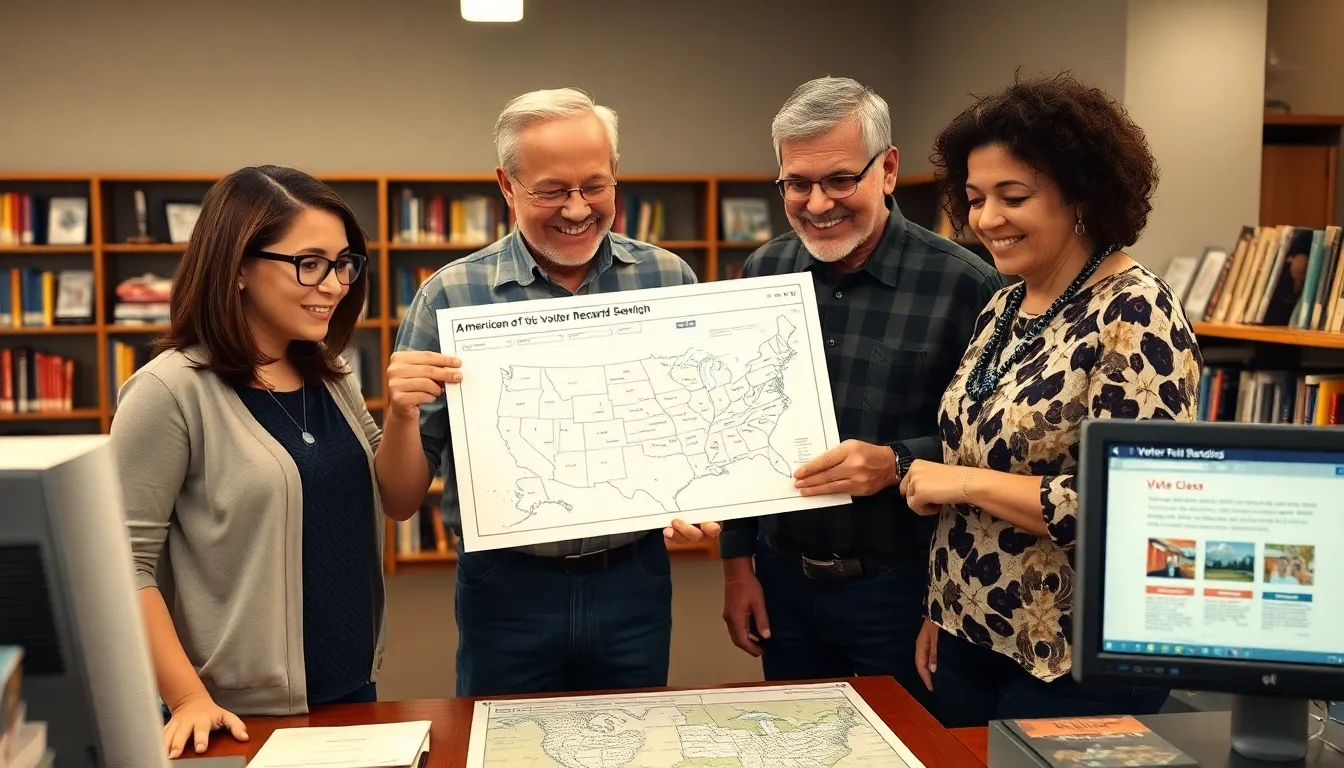Imagine this: you’re at a party, and the topic of voting comes up. Suddenly, you realize you can’t remember if your neighbor Bob actually voted last election or just claimed he did to sound cool. Enter the magical world of voter records search by name! This handy tool lets anyone peek behind the curtain of civic participation without needing a magnifying glass or a secret decoder ring.
Table of Contents
ToggleOverview of Voter Records
Voter records provide essential insights into civic participation. These records serve as a public database, allowing individuals to verify participation in elections.
Importance of Voter Records
Voter records play a pivotal role in promoting transparency in the electoral process. They enable individuals to confirm whether someone cast a ballot. This information can deter voter fraud and encourage civic engagement. Transparency fosters trust in the democratic system. Accessing these records aids in understanding voting trends and behaviors among various demographics. Knowing participation rates helps organizations plan outreach efforts. An engaged citizenry often leads to more representative governance.
Types of Voter Records
Multiple types of voter records exist, each offering unique insights. Registration records contain information on voters, including names, addresses, and party affiliations. Voting history records reveal election participation details, such as dates and outcomes. Polling place records show where individuals typically cast their votes. Additionally, absentee and early voting records detail alternative voting methods utilized by citizens. Accessing these various types of records provides a comprehensive view of civic engagement within communities. Each type serves a specific purpose in understanding electoral participation.
How to Perform a Voter Records Search by Name

Performing a voter records search by name provides insight into an individual’s voting history and civic engagement. Various methods exist to access these records, both online and offline.
Online Resources for Voter Records
Several online platforms offer easy access to voter records. State election offices typically maintain official websites with searchable databases. Websites like Vote.org and Can I Vote allow users to enter names, and these platforms display relevant information, such as voting status and registration details. Additionally, third-party sites may provide aggregate data, though accuracy can vary. Users should verify the credibility of these websites before relying on the information provided.
Offline Methods for Accessing Records
Individuals can access voter records offline through local election offices or county clerk offices. Visiting these offices in person often yields detailed information about voting history and registration. Phone calls to these offices may also provide necessary insights, especially for those unable to visit. In some states, public libraries house copies of voter records, making them accessible to local residents. Requesting records via mail is another option; however, processing times may increase.
Legal Considerations
Voter records searches by name involve specific legal frameworks governing privacy and access. Understanding these legal considerations ensures responsible handling of sensitive information.
Privacy and Access Rights
Privacy concerns surrounding voter records arise from the potential misuse of personal data. Individuals possess rights that safeguard their information from unauthorized access. The Freedom of Information Act allows public access to certain voter records, while state laws may impose additional restrictions. Accordingly, transparency balances with the need for confidentiality. Moreover, entities conducting searches must adhere to lawful practices to protect the privacy of individuals.
State-Specific Laws
State-specific laws dictate the availability and accessibility of voter records. Each state defines its regulations regarding data access and dissemination. Some states allow unrestricted access, while others require proof of legitimate interest for inquiries. Distinctions in laws exist, causing variations in the level of detail accessible through searches. Individuals seeking records should review state regulations to ensure compliance with local statutes. Consequently, following these laws aids in maintaining the integrity of the electoral process.
Benefits of Voter Records Search by Name
Performing a voter records search by name offers several advantages. Accessing these records can confirm whether individuals meet voter eligibility requirements.
Verifying Voter Eligibility
Verifying voter eligibility becomes straightforward with access to voter records. Individuals can check registration statuses and ensure compliance with state-specific rules. Unique attributes of voter registration data include confirmation of address and age. This verification process aids organizations in ensuring that only eligible individuals participate in elections. Additionally, non-profit groups may utilize this information to structure outreach campaigns effectively. Knowing whether someone is registered allows organizations to focus their efforts on unregistered citizens.
Researching Election Participation
Researching election participation highlights trends in civic engagement. Patterns of voting behavior can offer insights into community interests and preferences. Understanding who votes enables political groups to tailor messages and strategies accordingly. By analyzing historical voting data, organizations can assess turnout rates and identify underrepresented demographics. This information is crucial for facilitating targeted outreach efforts. Furthermore, it can enhance campaign strategies by aligning messaging with community values. Overall, being informed about voter participation encourages accountability among citizens and promotes a healthy democracy.
Common Challenges and Solutions
Conducting a voter records search by name can present various challenges. Addressing these challenges effectively ensures accurate information access and a smooth search process.
Information Accuracy
Accurate voter records prove crucial for reliable insights into voting behaviors. Errors in records can stem from outdated or misfiled entries, leading to confusion. Individuals should double-check the information found online against official state databases for verification. State election offices maintain updated databases, serving as the most reliable sources. Additionally, consulting multiple resources helps confirm data accuracy, reducing the chances of misinformation. By prioritizing accuracy, searchers can foster trust in the information gathered.
Navigating Complex Systems
Navigating the systems that house voter records requires familiarity with varying processes. Each state has its own procedures for accessing records, which may involve different types of requests. Some states offer online portals that simplify access; others might require in-person visits. Understanding the specific laws governing access in each state is essential for compliance. Individuals may face challenges when records are housed within multiple jurisdictions, complicating the search. Using local election office contacts aids in clarifying procedures and accessing necessary records more efficiently. This approach streamlines the process, ensuring smoother navigation through complex systems.
Voter records search by name serves as a powerful tool for promoting transparency and civic engagement. By accessing these records individuals can gain insights into voting behaviors and verify participation, ultimately fostering trust in the electoral process.
While navigating the complexities of state-specific laws and privacy considerations can be challenging, the benefits of understanding voter engagement trends are significant. Organizations can tailor their outreach efforts and ensure compliance with eligibility requirements, contributing to a healthier democracy.
Staying informed about the resources available for conducting these searches empowers citizens to participate actively in the democratic process and hold each other accountable.




